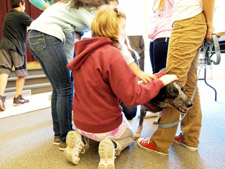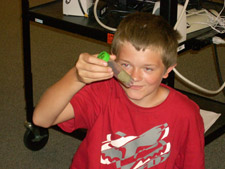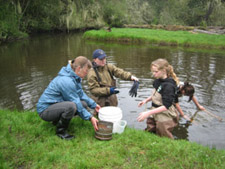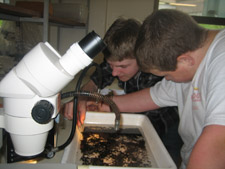Spring Update on Friday Harbor Labs Science Outreach Program
By Jenny Roberts, FHLSOP Program Director
Friday Harbor Labs Science Outreach Program is pleased to announce the successful completion of its eleventh year of bringing exciting, hands-on, inquiry-based and relevant environmental science into San Juan Island Schools: Friday Harbor Elementary School (FHES), Friday Harbor Middle School (FHMS) and Spring Street International School (SSIS). During this busy spring season, local students participated in the following engaging projects in the field, lab, and classroom and on the University of Washington's Research Vessel Centennial:
FHES 2nd Grade "Is it a Plant or an Animal?" Inquiry Lab
FHES 3rd Grade Invasive Clam Dig
FHES 3rd Grade "Diver for a Day" Activity on the RV Centennial
FHES 4th Grade Eelgrass Beds & Beach Seine
FHES 5th Grade Water Quality Sampling in Friday Harbor Marina
FHES 6th Grade Soft Sediment & Rocky Shore Intertidal Ecosystem Surveys
SSIS 6th & 7th Grade Watershed Water Quality Sampling
SSIS 7th Grade Benthic Macroinvertebrate Stream Sampling, Sorting and Identifying
FHMS 7th Grade Whale Watch Adventure Day
FHMS 8th Grade Student Designed Marine Biology Inquiry & Field Experience Projects
FHHS Chemistry Electrophoresis Exploration Lab
Please visit our website for detailed descriptions of the above listed projects and to learn more about the Outreach Program: http://depts.washington.edu/fhlk12/index.html Below two Spring programs that are new this year are highlighted:
Friday Harbor Middle School 7th Grade Whale Watch Adventure Day
 FHLSOP's new assistant coordinator, Kari Koski, teamed up with FHMS teachers and the Whale Museum staff to create informative and intriguing activities so the students would be savvy investigators when they embarked on their whale watching trip. Whale Watch Adventure Day consisted of a full day of activities learning about island geography, salmon behavior through games, orca identification and the Conservation Canine (CK9) team. Meeting a CK9 dog, learning about their job and seeing Max the dog in action were highlights of the day.
FHLSOP's new assistant coordinator, Kari Koski, teamed up with FHMS teachers and the Whale Museum staff to create informative and intriguing activities so the students would be savvy investigators when they embarked on their whale watching trip. Whale Watch Adventure Day consisted of a full day of activities learning about island geography, salmon behavior through games, orca identification and the Conservation Canine (CK9) team. Meeting a CK9 dog, learning about their job and seeing Max the dog in action were highlights of the day.
 Max's job is to point out whale scat/poop drifting in the water so it can be collected and studied. Whale poop is in much demand by scientists but very hard to come by. Scientists measure several hormones and toxins from the whale scat that allow them to determine the health of the whale populations and indirectly the health of the Salish Sea. Max hasa keen sense of smell and strong drive to find whale poop as long as he is rewarded with a few minutes of playing ball. The human researchers/dog handlers from the team brought a vial of orca poop and hid it among the students. Max found it within a few moments and then was rewarded with student cheers and, more importantly, some ball time. Students had the pleasure of greeting Max and having a whiff of whale poop. Not surprisingly, the whale waste smells like fish (almost fresh). What a great day and learning experience!
Max's job is to point out whale scat/poop drifting in the water so it can be collected and studied. Whale poop is in much demand by scientists but very hard to come by. Scientists measure several hormones and toxins from the whale scat that allow them to determine the health of the whale populations and indirectly the health of the Salish Sea. Max hasa keen sense of smell and strong drive to find whale poop as long as he is rewarded with a few minutes of playing ball. The human researchers/dog handlers from the team brought a vial of orca poop and hid it among the students. Max found it within a few moments and then was rewarded with student cheers and, more importantly, some ball time. Students had the pleasure of greeting Max and having a whiff of whale poop. Not surprisingly, the whale waste smells like fish (almost fresh). What a great day and learning experience!
Spring Street International School 7th grade Benthic Macroinvertebrate Stream Sampling, Sorting and Identifying
 FHLSOP staff introduced science students to the importance of watersheds and the procedures for testing their water quality. Students collected data on physical and biological parameters to determine the watershed's stream health. One of the biological parameters used as indicators of stream health was benthic macroinvertebrates (mostly insects, worms, snails and spiders). To understand their ecological importance, students had to learn about the benthic macroinvertebrate's (BMIs) taxonomy, morphology, their functional roles and feeding types. In the field, students used kick-nets and sieve trays to collect BMIs. In the lab, students sorted and identified these insects, worms, etc.
FHLSOP staff introduced science students to the importance of watersheds and the procedures for testing their water quality. Students collected data on physical and biological parameters to determine the watershed's stream health. One of the biological parameters used as indicators of stream health was benthic macroinvertebrates (mostly insects, worms, snails and spiders). To understand their ecological importance, students had to learn about the benthic macroinvertebrate's (BMIs) taxonomy, morphology, their functional roles and feeding types. In the field, students used kick-nets and sieve trays to collect BMIs. In the lab, students sorted and identified these insects, worms, etc.  Students then analyzed their results and concluded that the health of the Beaverton Valley Stream was "excellent" and that False Bay Creek was "good" according to the U.S. Environmental Protection Agency, Rapid Bioassessment Protocols for Use in Streams and Rivers, Benthic Macroinvertebrates and Fish, Pollution Tolerance Index. Science in action!
Students then analyzed their results and concluded that the health of the Beaverton Valley Stream was "excellent" and that False Bay Creek was "good" according to the U.S. Environmental Protection Agency, Rapid Bioassessment Protocols for Use in Streams and Rivers, Benthic Macroinvertebrates and Fish, Pollution Tolerance Index. Science in action!
FHLSOP staff is looking forward to a fun and productive twelfth year. If you'd like to help support FHLSOP please contact Rachel Anderson at 206-616-0760 or rachelea@uw.edu . You can also support the FHLSOP online.
Illustrations for Friday Harbor Middle School 7th Grade Whale Adventure Day
image 1:
Conservation Canine (CK9) Max by John McCain
image 2: Smelling whale poop by John McCain
Illustrations for Spring Street International School 7th grade Benthic Macroinvertebrate Stream Sampling, Sorting and Identifying
image 3: Sampling microinverterbrates by Kari Koski
image 4: Sorting microinverterbrates by Jenny Roberts

